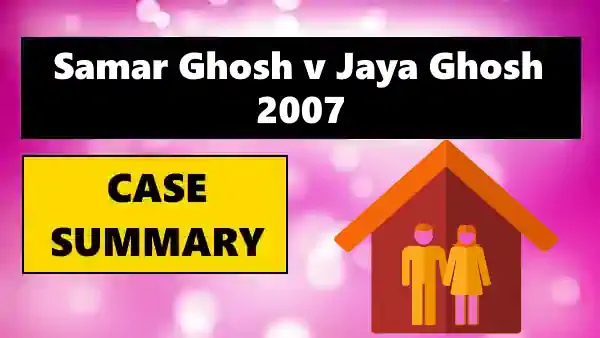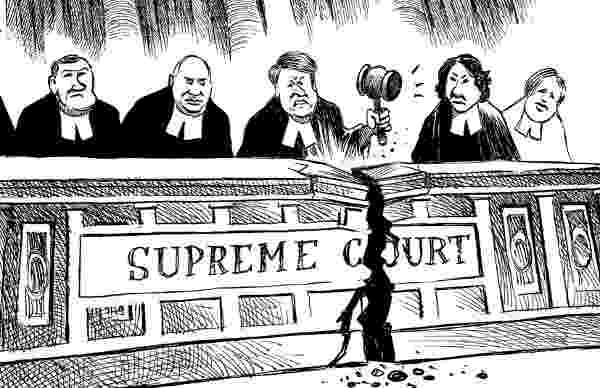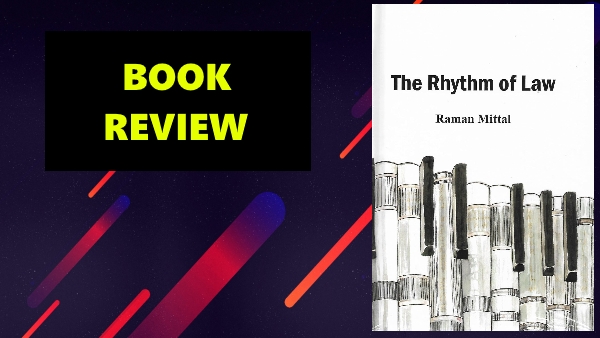Samar Ghosh v Jaya Ghosh case was the case for divorce on the ground of mental cruelty. Marriages in India are considered being a sacred relationship between husband and wife. But nowadays breakdown cases of marriages are very common and often comes before the courts.
CITATION
(2007) 4 SCC 511
BENCH
Hon’ble Justice B.N. Agrawal
Hon’ble Justice P.P. Naolekar
Hon’ble Justice Dalveer Bhandari
RELEVANT PROVISIONS
Section 13 of the Hindu Marriage Act, 1955
FACTS OF SAMAR GHOSH VS JAYA GHOSH CASE
- The appellant, i.e. Samar Ghosh, was married to the respondent, i.e. Jaya Ghosh 13th December, 1984 at Calcutta under the Special Marriage Act, 1954.
- Both the parties are ‘IAS’ officials. The respondent was divorced and had a female child from their first marriage and custody of that child was given by the court to her.
- Just after the marriage, the respondent himself decided not to give a birth to a child for two years and also not allowing the appellant to talk with her child. After the one year of marriage, the appellant suffered from prolonged illness.
- During this course of time respondent, without having concern towards the health appellant, left him alone and went to meet her brother who was working in Bareilly.
- Appellant was alone in a residential place and there was no one there who can look after for him in Calcutta. Appellant got transferred after two years after Calcutta, but because of poor health, he was again transferred back to Calcutta and they again start living together with building healthy relations between them.
- There was a servant cum cook was also lived up with them, but later on the cook was moved from there and the appellant needs to take meals for her from outside because the respondent was only used to prepare his own meal.
- Once there was a time when one incidence took place where the appellant felt insulted when respondent shouts him in front of appellant’s servant. From that time onwards, they started living separately.
ISSUES OF THE CASE
- Whether the respondent was guilty of cruelty?
- Whether the appellant entitled to get divorce decree?
CONTENTION OF THE PARTIES
APPELLANT- The appellant argued respondent refused to have cohabitation and the respondent alone decided to have a child.
Further, the respondent was having no care feeling toward the petitioner when he was prolonged illness, and the act of humiliating the appellant involves the act of mental cruelty.
That the petitioner and respondent were living separately for over sixteen years and thereafter, no interactions have been made between them.
REPSONDENT- The respondent contended that she never said these things about not having a child for two years of marriage.
The appellant started living with the respondent, which amounts to the condonation of cruelty. She also added that not cooking the food for petitioner doesn’t amount to mental cruelty.
That no such incidence was ever happened in which she insulted her husband in front of a servant.
RATIO DECIDENDI OF SAMAR GHOSH V JAYA GHOSH CASE
- The Apex court explains the concept of cruelty deeply through various precedents. Mental Cruelty is a state of mind.
- The Supreme court considered that there was ‘No uniform standard can ever lead to determine mental cruelty.’ The Court further concluded that “There can be no straightjacket formula or fixed parameters for determining mental cruelty in matrimonial matter. Mere trivial irritations, quarrel, normal wear and tear of the married life happening in day-to-day life are not adequate for grant of divorce.”
- The Apex Court concluded that “the approach from the High Court in deciding this matter was far from satisfactory.”
- However, the Court considered that individual decision of refusal to cohabit for, without there being any physical incapacity or valid reasons, amounts to mental cruelty.
- The court also opined that having individually decision of wife or husband for not having child after the marriage may also amount to cruelty.
DECISION IN SAMAR GHOSH VS JAYA GHOSH
The District Judge granted the decree order of divorce on 19th December, 1996 in favor of petitioner by concluded the facts that refusal to cohabit with the plaintiff and her individual decision of not having children after marriage involves the mental cruelty to the plaintiff and the marriage between the parties were dissolved.
Further, the appeal was filed by respondent against said order to the Division Bench of High Court where the above said order was reversed by giving reasons of that the allegations of mental cruelty made by petitioner had not proved by him. Further, the appeal was decided by the Supreme Court.
APPEAL
The decision of appeal made by the Supreme Court by stating that the High Court seriously erred by reversing the judgment by District Judge and hence Apex Court set aside the order of High Court and decree of learned District Judge of mental cruelty had been restored.
Found Samar Ghosh v Jaya Ghosh case summary useful? We have a bunch of useful topics from family law that will help you in your preparation here >>> FAMILY LAW
Check out our YouTube Channel for free legal videos >>> LAW PLANET YT





